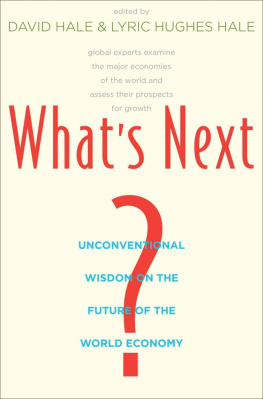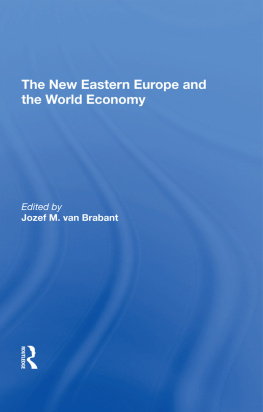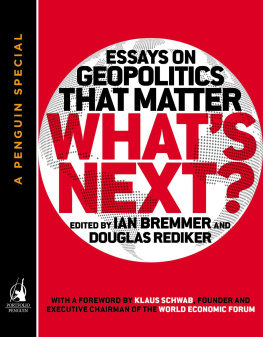WHATS NEXT?
WHATS NEXT?
Unconventional Wisdom
on the Future of the World Economy
Edited by David Hale and
Lyric Hughes Hale

Chapter 21, "The Future of Corporate Compliance" is reprinted from "Corporate Compliance Practice Guide: The Next Generation of Compliance" with permission. Copyright 2009 Matthew Bender and Company, Inc., a member of the LexisNexis Group. All rights reserved.
Copyright 2011 by David Hale and Lyric Hughes Hale
All rights reserved.
This book may not be reproduced, in whole or in part, including illustrations, in any form (beyond that copying permitted by Sections 107 and 108 of the U.S. Copyright Law and except by reviewers for the public press), without written permission from the publishers.
Yale University Press books may be purchased in quantity for educational, business, or promotional use. For information, please e-mail sales.press@yale.edu (U.S. office) or sales@yaleup.co.uk (U.K. office).
Set in Galliard Old Style type by Westchester Book Services
Printed in the United States of America.
Library of Congress Cataloging-in-Publication Data
Whats next? : unconventional wisdom on the future of the world economy / edited by David Hale and Lyric Hughes Hale.
p. cm.
Includes bibliographical references and index.
ISBN 978-0-300-17031-3 (pbk. : alk. paper)
1. Economic history21st century. 2. Economic forecasting. I. Hale, David. II. Hale, Lyric Hughes.
HC59.3.W47 2011
330.9dc22
2010053413
A catalogue record for this book is available from the British Library.
This paper meets the requirements of ANSI/NISO Z39.48-1992 (Permanence of Paper).
10 9 8 7 6 5 4 3 2 1
For our children, who have allowed us to travel the world : Aria, Erin, Devin, Harmony, Jennie, and granddaughter Cadence.
CONTENTS
Lyric Hughes Hale
David Hale
i.
David Hale
Joshua Mendelsohn
Timothy Heyman
Pedro Pablo Kuczynski
ii.
Anatole Kaletsky
iii.
Louis-Vincent Gave
Robert Madsen
Richard B. Katz
iv.
Keith Jefferis
Iraj Abedian
Saul Eslake
v.
John Greenwood
David Hale
vi.
Albert Bressand
Narimon Safavi
Brian Fisher and Anna Matysek
vii.
Tim Congdon
Andrew Sheng
Jack Mintz
Michael T. Lewis
Carole Basri
viii.
Thierry Malleret
Mark Roeder
The current global financial crisis has exposed the limits of economic forecasting. Or has it? Was it simply that the best voices were not heard over the media cacophony? Perhaps the data itself were misleading and inaccurate. Perhaps as economic actors, bureaucrats, and politicians, we are too focused on immediate events to take the future into account, even though we know that we should. Regulators might have underestimated the greed and cunning of Wall Street operators. Or we, as human beings, just might not be wired to understand and predict the future.
Throughout this period of economic turbulence, my husband, economist David Hale, and I have been exposed to other voices that have helped us to make sense of the enormous changes that have taken place on a global basis since 2008. We have been informed by commentators whom we believe to be some of the best thinkers in the world. Most of them are independent intellectuals, with no loyalty or responsibility to financial institutions, who are not well known outside of their area of expertise. Our realization that not everyone has had access to these authors was the impetus for this book.
We began the grand task of asking these authors, many of them friends, to write about their vision for the future, based upon their respective fields of knowledge. We hope this kaleidoscope of information and opinion will create a triangulated perspective that will allow our readers to formulate their own version of Whats Next?
As the global financial crisis became a juggernaut, the public appropriately raised the question, why didnt anyone, economists in particular, see this coming? What is the value of economic research? Two new closely allied fields, behavioral economics and neuroeconomics, have attempted to bring the human factor to bear on neoclassical theories. Nobel Prize winner Paul Krugman has also blamed a reliance on what he calls mathematical elegance in economics. Doubts about statistics, once largely confined to third world countries, and in particular China, have surfaced in first world countries.
The herd mentality, the weakness of financial regulatory bodies, and institutional deficiencies are now commonly discussed. Seemingly benign technological advances are also seen as having a detrimental effect, due to the speed and interconnectedness of markets. And globalization has created efficiencies and contagion effects simultaneously. The small town in Norway, which lost its savings to international bankers selling sure investment instruments, would be an example of financial asymmetry.
As Berkeley economist Barry Eichengreen has said, We now know that the gulf between assumption and reality was too wide to be bridged. These models were worse than unrealistic. They were weapons of mass economic destruction.
My own opinion is that what we are witnessing are the growing pains of the internationalization of markets. Lessons learned, we will create greater long-term stability. A gradual economic rebalancing will take place. Inexorable trends, such as outsourcing of US manufacturing to China, will reverse themselves over time. In fact, that has already begun to happen. Concerns over logistics costs, rising wages in China, and productivity issues such as just-in-time delivery have now given US companies an edge. US manufacturing has made a gradual recovery, which in turn will create more jobs. The unanswerable question is when.
Many of our contributors have bravely tried to answer this question. They have ably presented their knowledge and experience and have offered their assumptions for debate with the reader. Our goal is not only to help you answer the question Whats Next? but also to spur you to explore What If?
We would like to thank our many contributors for their efforts. In this quickly moving world, faced with the realities of publishing, they have been asked to update and prognosticate into the distant future. No matter how things turn out, this book will give you a frame of reference, and a perspective, that goes beyond the current received wisdom.
We would like to express our gratitude to the members of the staff of David Hale Global Economics. Sandy Abraham provided creative inspiration and enthusiasm, and is responsible for editing the graphic presentations throughout the book. Sandy worked with the firms clients in the investment world to gain valuable feedback. Economist Mark Zoff worked tirelessly for many months, coordinating, updating, copyediting, and rigorously fact-checking the work of the contributors in a fast-changing environment for forecasters. These efforts have combined to create a book that is at once visionary and scholarly, useful to both professionals and the reader who simply wants to know more about what is going on in the financial world than what is reported in the media, and at a more profound level. Kenneth Dam, our friend of many years, who critiqued the manuscript and provided a wealth of valuable suggestions that allowed us to improve the text throughout. Given the scope of this book, very few reviewers would have had the breadth to accomplish this difficult task. We cannot thank him enough.
Finally, we would like to thank our editor at Yale Press, Michael OMalley. Without his encouragement and optimism, this book would not have made the rough passage between concept and conclusion.
Next page




